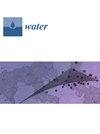The Temperature-Influenced Scaling Law of Hydraulic Conductivity of Sand under the Centrifugal Environment
IF 3
3区 环境科学与生态学
Q2 ENVIRONMENTAL SCIENCES
引用次数: 0
Abstract
Accurate characterization of soil hydraulic conductivity influenced by temperature under a centrifugal environment is important for hydraulic and geotechnical engineering. Therefore, a temperature-influenced scaling law for hydraulic conductivity of soil in centrifuge modeling was deduced, and a temperature-controlled falling-head permeameter apparatus specifically designed for centrifuge modeling was also developed. Subsequently, a series of temperature-controlled falling-head tests were conducted under varying centrifugal accelerations to achieve the following objectives: (1) examine the performance of the apparatus, (2) investigate the influence of temperature and centrifugal acceleration on the hydraulic conductivity of sand and its scaling factor, and (3) validate the proposed scaling law for hydraulic conductivity. The main conclusions of the study are as follows. Firstly, the apparatus demonstrated good sealing and effectively controlled the temperature of both the soil specimen and the fluid. Secondly, the hydraulic conductivity of sand was not constant but varied over time, likely due to the presence of radial seepage in addition to vertical seepage as the test progressed. Thirdly, temperature significantly influenced the hydraulic conductivity of sand and its scaling factor under the same centrifugal acceleration. Therefore, it is essential to closely monitor the temperature of models during centrifugal tests. Finally, the measured and calculated values of the scaling factor index for the hydraulic conductivity of sand showed good agreement, verifying the proposed scaling law.离心环境下砂的导水性受温度影响的缩放规律
在离心环境下,准确描述受温度影响的土壤导水性对于水利和岩土工程非常重要。因此,我们推导出了离心机建模中受温度影响的土壤导水性缩放定律,并开发了专为离心机建模设计的温控落头式渗透仪。随后,在不同离心加速度条件下进行了一系列温控落头试验,以实现以下目标:(1)检验仪器的性能;(2)研究温度和离心加速度对砂土导水率及其缩放因子的影响;(3)验证所提出的导水率缩放定律。研究的主要结论如下。首先,仪器具有良好的密封性,能有效控制土壤试样和流体的温度。其次,砂的水力传导性并非恒定不变,而是随时间而变化,这可能是由于随着试验的进行,除了垂直渗流外,还存在径向渗流。第三,在相同的离心加速度下,温度对沙子的水力传导率及其缩放因子有很大影响。因此,在离心试验过程中必须密切监测模型的温度。最后,砂的水力传导性缩放因子指数的测量值和计算值显示出良好的一致性,验证了所提出的缩放定律。
本文章由计算机程序翻译,如有差异,请以英文原文为准。
求助全文
约1分钟内获得全文
求助全文
来源期刊

Water
WATER RESOURCES-
CiteScore
5.80
自引率
14.70%
发文量
3491
审稿时长
19.85 days
期刊介绍:
Water (ISSN 2073-4441) is an international and cross-disciplinary scholarly journal covering all aspects of water including water science and technology, and the hydrology, ecology and management of water resources. It publishes regular research papers, critical reviews and short communications, and there is no restriction on the length of the papers. Our aim is to encourage scientists to publish their experimental and theoretical research in as much detail as possible. Full experimental and/or methodical details must be provided for research articles. Computed data or files regarding the full details of the experimental procedure, if unable to be published in a normal way, can be deposited as supplementary material.
 求助内容:
求助内容: 应助结果提醒方式:
应助结果提醒方式:


